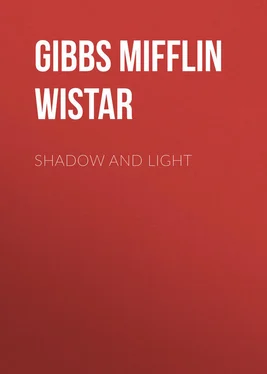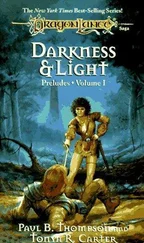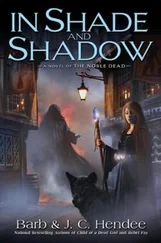Mifflin Gibbs - Shadow and Light
Здесь есть возможность читать онлайн «Mifflin Gibbs - Shadow and Light» — ознакомительный отрывок электронной книги совершенно бесплатно, а после прочтения отрывка купить полную версию. В некоторых случаях можно слушать аудио, скачать через торрент в формате fb2 и присутствует краткое содержание. Жанр: foreign_antique, foreign_prose, на английском языке. Описание произведения, (предисловие) а так же отзывы посетителей доступны на портале библиотеки ЛибКат.
- Название:Shadow and Light
- Автор:
- Жанр:
- Год:неизвестен
- ISBN:нет данных
- Рейтинг книги:4 / 5. Голосов: 1
-
Избранное:Добавить в избранное
- Отзывы:
-
Ваша оценка:
- 80
- 1
- 2
- 3
- 4
- 5
Shadow and Light: краткое содержание, описание и аннотация
Предлагаем к чтению аннотацию, описание, краткое содержание или предисловие (зависит от того, что написал сам автор книги «Shadow and Light»). Если вы не нашли необходимую информацию о книге — напишите в комментариях, мы постараемся отыскать её.
Shadow and Light — читать онлайн ознакомительный отрывок
Ниже представлен текст книги, разбитый по страницам. Система сохранения места последней прочитанной страницы, позволяет с удобством читать онлайн бесплатно книгу «Shadow and Light», без необходимости каждый раз заново искать на чём Вы остановились. Поставьте закладку, и сможете в любой момент перейти на страницу, на которой закончили чтение.
Интервал:
Закладка:
There were few, if any, available halls for these meetings. The only resort was the colored churches. Those under the auspices of white denominations had members who objected to their use for such a purpose. Craven and fawning, content with the crumbs that fell from these peace-loving Christians, who deprecated the discussion of slavery while they ignored the claim of outraged humanity, these churches were more interested in the physical excitement of a "revival" than in listening to appeals in behalf of God's poor and lonely. Their prototypes that "passed by on the other side" have been perpetuated in many climes, in those who believe that it is the formalities of contact with the building that blesses a people and not the Godliness and humanity of the worshippers that give glory and efficacy to the church. An antagonism thus created resulted in a crusade against such churches styled "Come-Outerism," and many left them on account of such apathy to carry on the warfare amid congenial association.
It has been said that citizenship was precipitated upon the Negro before he was fit for its exercise. Without discussing the incongruity of this, when applied to the ignorant native Negro and not to the ignorant alien emigrant, it may be conceded that keeping them in abject bondage with no opportunity to protest, made slavery anything but a preparatory school for the exercises of civic virtues, or the assumption of their responsibilities. It was not true, however, with the mass in the free, or many in the slave States. Always akin and adjunct are the yearnings indestructible in human nature for equal rights. And in every age and people the ratio of persistency and sacrifice have been the measure of their fitness for its enjoyment. During 25 years preceding the abolition of slavery the colored people of the free States, though much proscribed, were active in their protests against enslavement, seizing every chance through press and forum "to pour the living coals of truth upon the nation's naked heart," setting forth in earnest contrast the theory upon which the government was founded with its administration as practiced.
In 1848 Philadelphia Square, whereon the old State House of historic fame still stands, was made resonant by the bell upon whose surface the fathers had inscribed "Proclaim liberty throughout the world and to all the inhabitants thereof," and was bedecked with garlands and every insignia of a joyful people in honor of the Hungarian patriot, Louis Kossuth. Distinctive platforms had been erected for speakers whose fatherland was in many foreign lands. Upon each was an orator receiving the appreciation and plaudits of an audience whose hearts beat as one for success to the "Great Liberator." The "unwelcome guests," the colored men present, quickly embraced the opportunity, utilizing for a platform a dry goods box, upon which I was placed to give the Negro version of this climax of inconsistency and quintessence of hypocrisy. This was the unexpected. All the people, both native and foreign, had been invited and special places provided for all except the Negro, and on the native platform he was not allowed space. The novelty of the incident and curiosity to hear what the colored man had to say quickly drew a crowd equal to others of the occasion. Then, as now, and perhaps forever, there was that incalculable number of non-committals whose moral sense is disturbed by popular wrong, but who are without courage of conviction, inert, waiting for a leader that they may be one of the two that take place behind him, or one of three or four, or ten, who follow in serried ranks, that constitute the wedge-like motor that splits asunder hoary wrong, proximity to the leader being in ratio to their moral fibre. Most of the audience listened to the utterance of sentiments that the allurements of trade, or the exactions of society, forbade them to disseminate.
The occasion was an excellent one to demonstrate the heartlessness of the projectors, who, while pretending to glorify liberty in the distance, were treating it with contumely at home, where 3,000,000 slaves were held in bondage, and feeling keenly the ostracism of the slave as beyond the pole of popular sympathy or national compassion, with words struggling for utterance, I spoke as best I could, receiving toleration, and a quiet measure of approbation, possibly on the supposition, realized in the fruition of time, that such discussion might eventuate in the liberation of white men from the octopus of subserviency to the dictum of slavery which permeated every ramification of American society. I heard Hon. Cassius M. Clay, of Kentucky, sometime in the forties, while making a speech in Philadelphia, say: "Gentlemen, the question is not alone whether the Negroes are to remain slaves, but whether we white men are to continue free." So bitter was the onslaught on all, and especially on white men, politically and socially, who dared denounce slavery.
CHAPTER III
An event that came under my notice of startling character, attracting national attention, was the arrival of the schooner "Amistad" at Philadelphia in 1840. This vessel had been engaged in the slave trade. With a cargo of slaves from Africa was destined for one of the West India Islands. Cinguez, one of, and at the head of the captives, rebelled while at sea, killing a number of the crew and taking possession of the ship.
In the concluding scene of the foregoing drama, Mr. Douglass was an actor, I an observer. After the decision giving them their liberty, the anti-slavery society, who had been vigilant in its endeavors to have them liberated ever since their advent on American shores, held a monster meeting to receive them.
Frederick Douglass introduced "Cinguez" to the meeting. I cannot forget or fail to feel the inspiration of that scene. The two giants locked in each others embrace, looked the incarnation of heroism and dauntless purpose, equal to the achievement of great results. The one by indomitable will had shaken off his own shackles and was making slavery odius by his matchless and eloquent arraignment; the other, "a leader of men," had now written his protest with the blood of his captors. Cinguez, with unintelligible utterance in African dialect with emphatic gesture, his liberty loving soul on fire, while burning words strove for expression, described his action on the memorable night of his emancipation, with such vividness, power, and pathos that the audience seemed to see every act of the drama and feel the pulsation of his great heart. Through an interpreter he afterwards narrated his manner of taking the vessel, and how it happened to reach American shores. How, after taking the ship, he stood by the tiller with drawn weapon and commanded the mate to steer back to Africa. During the day he complied, but at night took the opposite course. After sometime of circuitous wandering the vessel ran into Long Island Sound and was taken possession of by the United States authorities. Cinguez, as hero and patriot, ennobled African character.
When majority and the threshold of man's estate is attained, the transition from advanced youth to the entry of manhood is liable to casualties; not unlike a bark serenely leaving its home harbor to enter unfrequented waters, the crew exhilarated by fresh and invigorating breezes, charmed by a genial sky, it moves on "like a thing of beauty" with the hope of "joy forever." The chart and log of many predecessors may unheeded lie at hand, but the glorious present, cloudless and fascinating, rich in expectation, it sails on, fortunate if it escapes the rocks and shoals that ever lie in wait. It is unreasonable to expect a proper conception, and the happiest performance of life's duties at such a period, especially from those with easy and favorable environments, or who have been heedless of parental restraint, for even at an advanced stage in life, there have been many to exclaim with a poet:
Читать дальшеИнтервал:
Закладка:
Похожие книги на «Shadow and Light»
Представляем Вашему вниманию похожие книги на «Shadow and Light» списком для выбора. Мы отобрали схожую по названию и смыслу литературу в надежде предоставить читателям больше вариантов отыскать новые, интересные, ещё непрочитанные произведения.
Обсуждение, отзывы о книге «Shadow and Light» и просто собственные мнения читателей. Оставьте ваши комментарии, напишите, что Вы думаете о произведении, его смысле или главных героях. Укажите что конкретно понравилось, а что нет, и почему Вы так считаете.












